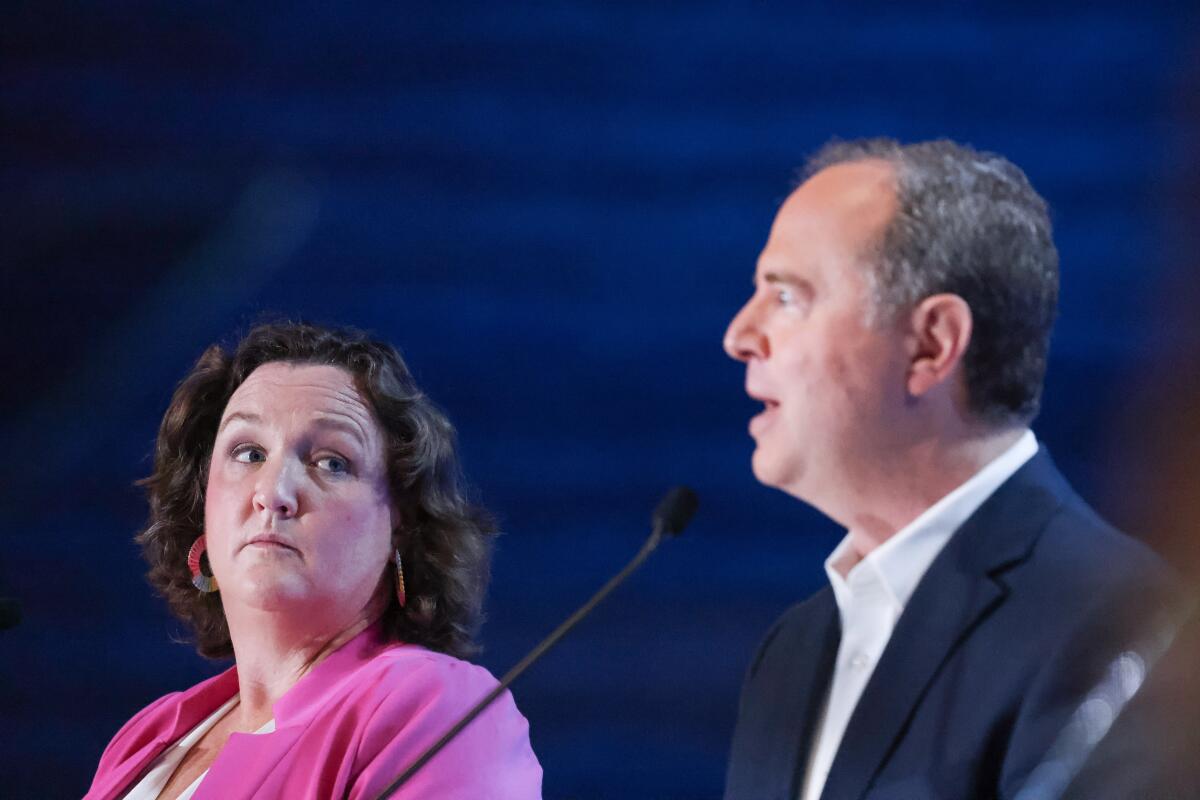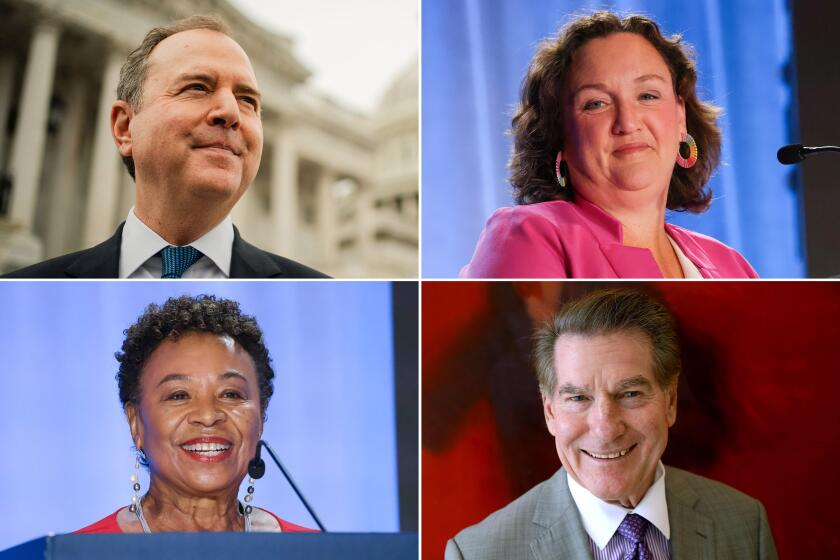Porter and Schiff polling neck and neck in California Senate race, in lead for a runoff

Reps. Adam B. Schiff and Katie Porter are in nearly a dead heat in California’s U.S. Senate race, well-positioned to move ahead to a runoff, a new poll shows.
The two well-funded House Democrats have been pacing the field since the beginning of the year. Other candidates, including fellow Democratic Rep. Barbara Lee and Republican former baseball star Steve Garvey, have so far not shown an ability to make the race more broadly competitive.
Porter, of Irvine, holds 17% support among voters likely to cast ballots in the March primary, and Schiff, of Burbank, is at 16%, in the latest UC Berkeley Institute of Governmental Studies poll, co-sponsored by The Times. Garvey comes in at 10% and Lee, of Oakland, has 9% of the vote, the poll found.
The poll standings represent a slight improvement in support for Lee and Garvey since the last Berkeley IGS poll, in August, while support for Schiff has declined slightly. But the shifts are all close to the poll’s margin of error, and none have changed the overall shape of the race. About 3 in 10 likely voters remain undecided.
Under California’s system, the top two finishers in March, regardless of party, will move forward to the general election runoff in November. The poll suggests that runoff will feature two Democrats, which was the case in the last election for this Senate seat, in 2018, when Sen. Dianne Feinstein defeated fellow Democrat Kevin de León. The seat is currently held by Sen. Laphonza Butler, who was appointed by Gov. Gavin Newsom after Feinstein’s Sept. 29 death but is not running for election to a full term.
“I think Lee and Garvey are the ones to watch in the second tier. Are any of them going to be able to get a little higher breakthrough to be the third possible candidate?” said Mark DiCamillo, director of the Berkeley poll and a longtime California pollster.
“Lee’s problem is she’s just not very well-known outside the Bay Area,” he said, noting that she faces the challenge of “broadening her appeal” to a statewide constituency.
The coalitions supporting each candidate have stayed roughly constant in recent months: Porter garners more support from younger voters and those who identify as strongly liberal. Voters under the age of 50 favor her over Schiff by more than a dozen percentage points, and she leads among people who identify as strongly liberal by 15 percentage points.
Schiff is ahead with voters 65 and older and those who identify as somewhat liberal. The two are essentially tied among voters who identify as Democrats.
Lee, who is one of three Black members of Congress from California, now leads among Black voters statewide, which was not the case earlier in the campaign.
Porter, Schiff and Lee have been crisscrossing the state, attending forums hosted by unions and advocacy groups, holding fundraisers and doing small town hall meetings with voters.
But the near-even division between the two parties in the House has often kept all three in Washington so as not to miss votes. The consequence is that most campaigning occurs when the chamber is in recess.
Geographically, Porter leads in Orange County, with 21% support from likely voters polled, while Garvey gets 15% support and Schiff 14%. Porter also leads Schiff by 6 points in voter-rich Los Angeles County (22% to 18%), and the two are essentially tied in the Central Valley and San Diego County.
Lee polls better among voters in the Bay Area than she does elsewhere. The three Democrats are closely bunched together there — Schiff with 19% support, Lee with 18% and Porter with 16%.
Garvey’s poor performance in the Bay Area is likely due to the region’s deeply liberal identity, but his 4% support there could also indicate that his main draw as a candidate — his years of playing for the Dodgers — don’t help him in Northern California, DiCamillo said.
Statewide, however, one possible hope for Garvey is that the undecided voters in the race tend to be more conservative and more likely to be Republicans than the overall electorate, suggesting that he may have some room to expand his support.
To get into the runoff, however, Garvey would have to consolidate most of the vote from the state’s Republican minority. That’s difficult with two other Republicans in the race — attorney Eric Early and businessman James Bradley.
Sen. Dianne Feinstein had announced that she would not seek reelection before her death. Here are the announced and potential candidates for her seat.
Garvey, who twice voted for former President Trump, has told supporters he will focus his campaign on quality-of-life issues such as education, the cost of living, housing affordability, crime and homelessness. He leads the poll among voters who identify as conservative.
The poll shows that the Senate race is not yet top of mind for many voters. Nearly half of likely voters have no opinion of Porter, for example. Similarly, about half of likely voters don’t know enough about Lee to render an opinion, and 58% said they don’t know enough about Garvey.
Likely owing to his prominent role in the Trump impeachments, Schiff is better-known, with just 31% of voters saying they don’t know enough about him to have an opinion.
But Schiff is also more polarizing: 40% of likely voters said they had a favorable view of him, and 29% said they had an unfavorable view. In Porter’s case, 38% had a favorable view and 17% had an unfavorable view.
Democratic consultant Bill Carrick said that as primary day inches closer, Schiff’s monumental fundraising advantage will likely begin to have an impact on polls.
Schiff has about $32 million in cash on hand, according to his latest financial disclosure report. That will translate into far more television and radio advertising than his rivals can afford. Porter reported the second-most cash on hand, with $12 million at the last fundraising deadline. The other candidates lag far behind in the money race.
California is famously difficult to campaign in owing to the size of its media markets and the huge cost of buying airtime. Schiff launched a digital advertisement this week, but none of the candidates have advertised on television yet.
The Berkeley-Times poll surveyed likely voters about which outlets they rely on for news and how that may relate to their candidate preferences. Local television and radio news remains far and away the most common way voters learn about the candidates, with 85% reporting they use them. Among likely voters, 58% said they turn to CNN and MSNBC to get up-to-speed on the race. The majority of the voters who rely on those two outlets identify as Democrats.
Lots of spectacle amid a focus on climate diplomacy.
The next three most popular sources were Google and other internet search engines, 43%; local or regional newspapers, online or in print, 38%; and government voter guides, 37%. The three sources were also favored more by Democrats than Republicans in the poll.
About a fifth of likely voters said they received information on the race from Fox News. The vast majority of them identified as Republicans.
Still, the primacy of television and radio made Carrick believe Schiff might have an advantage.
“I think the rubber meets the road when he starts buying broadcast and cable,” Carrick said, adding:
“That may be an advantage that he has much earlier.”
The Berkeley IGS poll surveyed 4,506 registered California voters considered likely to participate in the March primary. The poll was conducted online in English and Spanish, Oct. 24-30. The results were weighted to match census and voter registration benchmarks, so estimates of the margin of error may be imprecise; however, the results for the likely voter sample have an estimated margin of error of 2.5 percentage points in either direction.
More to Read
Get the L.A. Times Politics newsletter
Deeply reported insights into legislation, politics and policy from Sacramento, Washington and beyond. In your inbox three times per week.
You may occasionally receive promotional content from the Los Angeles Times.













